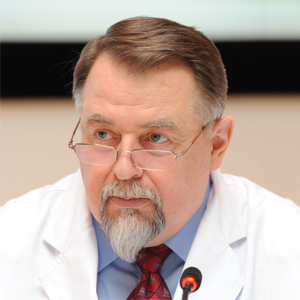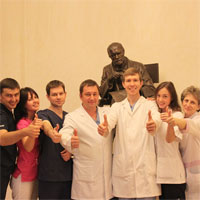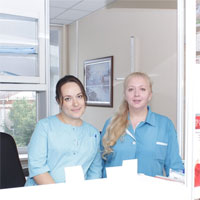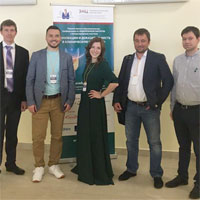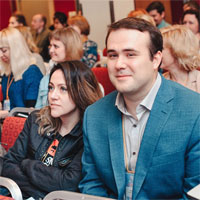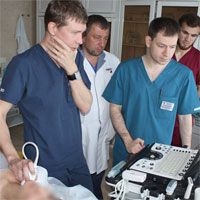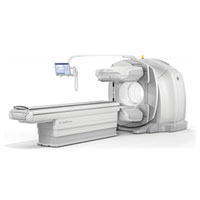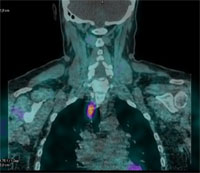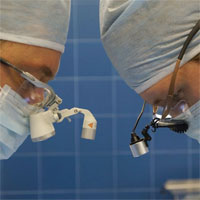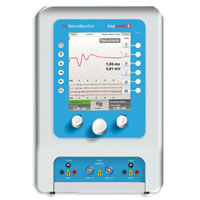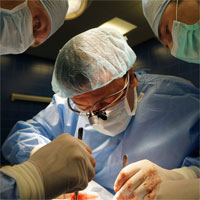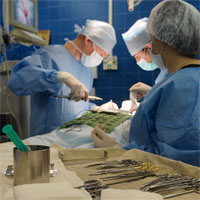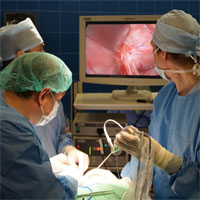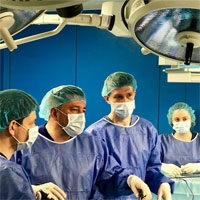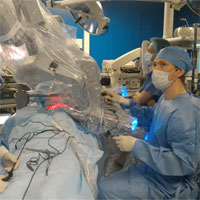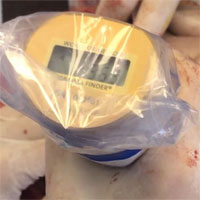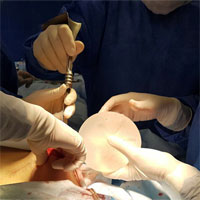The Center of Mammology and Endocrine Surgery includes the Department of Surgical Treatment of Cancer Patients (Surgery No. 1).
Chief of the center and department: Zhivotov Vladimir Anatolyevich, oncologist, surgeon, associate professor, Ph.D.
The Center of mammology and endocrine surgery is a division that uses the entire arsenal of innovative methods for diagnosing diseases of the endocrine organs.
Such methods of diagnosis as single photon emission computed tomography, stereotactic biopsy, expert ultrasound, MRI, CT according to European protocols and others are used in the center for a long time and effectively. Based on the results of the survey, individual (personalized) indications for surgical intervention are formed. The Pirogov National Medical and Surgical Center possesses a unique set of equipment for Russia for surgical interventions from extended reconstructive interventions using microsurgery to robot-assisted operations, endoscopic operations (laparoscopic, retroperitoneoscopic), which are used in the treatment of malignant and benign diseases of the thyroid gland, tumors of the parathyroid glands, adrenal glands, mammary glands and thymus gland. Studies of the quality of life of our patients and regular surveys show that over 96% of patients are satisfied with the result of the operation.
What do we treat
Diseases of:
- Thyroid gland;
- Parathyroid glands;
- Adrenal glands;
- Mammary gland.
Diseases of the thyroid gland:
- Cancer of the thyroid gland (papillary, follicular, medullary, including common forms).
Adrenal Diseases:
- Adrenal cancer;
- Hormonally active tumors of the adrenal glands;
- Hormonally inactive adrenal tumors.
The treatment and diagnosis are carried out by experienced doctors who have completed training at leading European centers of oncology and endocrine surgery.
Diagnostic capabilities and extent of operations
In the diagnosis of diseases of the thyroid gland, parathyroid glands and adrenal glands are used:
- Fine-needle aspiration biopsy under ultrasound control (including washing on thyroglobulin and calcitonin in the diagnosis of metastasis of thyroid cancer and washing on parathyroid hormone in the diagnosis of intrathyroid adenomas of the parathyroid glands);
- Scintigraphy of the thyroid and parathyroid glands, as well as single photon emission computed tomography in the diagnosis of parathyroid adenomas;
- CT scan with intravenous enhancement for the diagnosis of partially retrosternal and intrathoracic location of the hypertrophied thyroid gland, ectopic parathyroid glands, adrenal tumors (including 3D reconstruction).
Types of operations
Diseases of the thyroid gland, parathyroid glands, adrenal glands
- Thyroid cancer — thyroidectomy in combination with central lymphadenectomy (6th level of regional lymph nodes) and / or with single or bilateral lateral lymphadenectomy
(2-4 level of regional lymph nodes). Follicular tumor, toxic adenoma, nodular goiter — hemithyroidectomy or video-assisted hemithyroidectomy; - Laparoscopic or retroperitoneal unilateral adrenalectomy with a tumor, robotic-assisted adrenalectomy with lymphadenectomy (for adrenal cancer), traditional open adrenalectomy.
Mammary gland diseases:
- Mammary cancer;
- Fibrocystic mastopathy;
- Fibroadenoma;
- Nodular mastopathy;
- Other more rare diseases.
With any diseases of the mammary gland, you can undergo further examination in the CDC “Izmailovsky”.
In the diagnosis of breast disease are used:
- Ultrasound-controlled trepan biopsy,
X-ray semi-automatic trepan biopsy (for ultrasound negative formations); - Fine needle or trepan biopsy of lymph nodes of regional lymph nodes;
- Expert ultrasound of the breast and regional lymph nodes;
- Low dose mammography;
- Mammary gland MRI.
Treatment of breast diseases:
- Surgical treatment of benign tumors of the breast (including minimally invasive with ultrasound control);
- Treatment of malignant tumors of the mammary gland (including organ-sparing operations, operations with the restoration of the mammary glands with their own tissues or endoprostheses).
The treatment and diagnosis of breast diseases are carried out by experienced doctors who have undergone internships at leading European centers of oncology and reconstructive plastic surgery.
Standard extent of operations
Malignant neoplasms — organ-sparing surgeries and mastectomies (including skin-preserving), mainly with the restoration of the mammary glands with their own tissues or endoprostheses, delayed reconstruction of the mammary glands.
In breast cancer, palliative surgery, including the closure of major skin defects with displaced skin patches, as well as subsequent chemotherapy and radiation therapy.
Benign breast neoplasms — peritumoral resection (sectoral resection), including minimally invasive with ultrasound guidance and the use of localization needles.
Diagnostic and treatment methods
All types of operations on the thyroid gland, mammary glands, parathyroid glands, adrenal glands are performed in the department:
- Thyroidectomy (removal of the thyroid gland) for diseases with increased production of thyroid hormones, for thyroid cancer;
- Thyroidectomy with lymphadenectomy (removal of the thyroid gland and lymph nodes) for thyroid cancer with metastatic lymph node lesions;
- Hemithyroidectomy (removal of a thyroid lobe with an isthmus) for benign thyroid diseases;
- Laparoscopic adrenalectomy (removal of adrenal neoplasms through small punctures of the abdominal wall) for adrenal neoplasms (adenoma or cancer);
- Sectoral resection of the breast from a mini-access;
- Radical resection of the mammary gland with lymphadenectomy, including with plastics with silicone endoprostomy of the world’s leading manufacturers, as well as with plastics with using of patient’s own tissues;
- Radical mastectomy with lymphadenectomy with simultaneous mammary gland plasty with patient’s own tissues (TRAM flap, thoracodorsal flap) or with plastics silicone endoprostheses.
The department conducts diagnostic studies for the diagnosis of diseases of the mammary glands, organs of the endocrine system, and digestive organs:
- Fine-needle aspiration biopsy of the nodular formations of the thyroid and lymph nodes of the neck (including washing on thyroglobulin);
- Biopsy of parathyroid tumors under ultrasound control of tumors (with washing on parathyroid hormone);
- Fine-needle aspiration biopsy of the nodules of the mammary glands under ultrasound control;
- Trepanbiopsy (core biopsy) of the nodules of the mammary glands under ultrasound control;
- Trepanbiopsy under stereotactic control.
Why should you choose us?
- In our Center, there is the possibility of using open surgical, laparoscopic, thoracoscopic, endosurgical, and robotic-assisted methods of surgical treatment;
- Surgical treatment of any profile, of any size and of any degree of complexity, as well as high-tech types of surgical interventions;
- The most advanced high-tech operational equipment and medical devices of leading world manufacturers;
- Treatment in accordance with international protocols with proven effectiveness, adopted in leading clinics in Russia, Europe and the United States;
- Doctors with experience in clinics in Europe, the United States, leaders of the areas of domestic surgery. Many surgeons are certified both for work in Russia and abroad.
Information for a patient referred to a fine needle biopsy of the thyroid nodules
Fine-needle biopsy is the most important diagnostic method for examining patients with thyroid nodules, which makes it possible to reliably determine the nature of the identified node (benign or malignant). Malignant tumors are detected only in 5% of patients with nodes, so most often the remaining 95% of patients after receiving the results of a biopsy can continue treatment without surgery.
Fine-needle aspiration biopsy of the thyroid gland is carried out with a fine needle, always under the control of an ultrasound scan performed by an experienced specialist. The biopsy procedure takes about 5 minutes and is easily tolerated by all patients. After the biopsy in the area of the injection you will have a sticker that can be removed after 30 minutes. There are no restrictions after the puncture.
A biopsy is a safe procedure, it does not cause increased growth of the node or its malignant “degeneration”.
The result of the study and a free consultation by an endocrinologist surgeon can be obtained in an advisory room one week after the puncture.
Contact Information
Address: 105203, Moscow, Nizhnyaya Pervomayskaya str., 70
Contact phone number:
Fax:
How to reach us by using public transport
“Pervomaiskaya” metro station (last carriage of the train out of the city centre). From “Pervomaiskaya” metro station by any tram or trolley bus go to the stop “15th Parkovaya Street”. Go along the 15th Park Street to the intersection with the Nizhnyaya Pervomaiskaya Street, turn left and walk about a hundred meters to the entrance of the Pirogov National Medical and Surgical Center.








